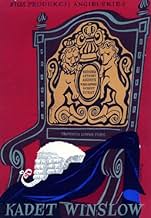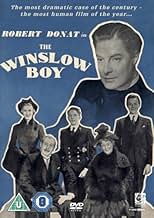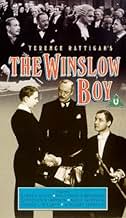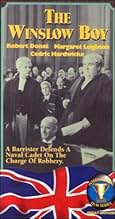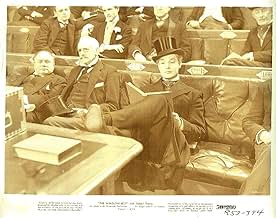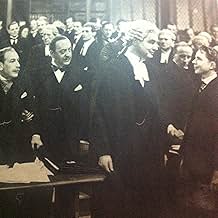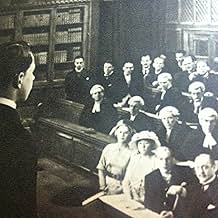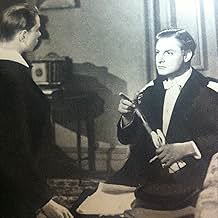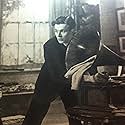IMDb RATING
7.6/10
1.9K
YOUR RATING
In pre-WWI England, a youngster is expelled from a naval academy over a petty theft, and his parents raise a political furor by demanding a trial.In pre-WWI England, a youngster is expelled from a naval academy over a petty theft, and his parents raise a political furor by demanding a trial.In pre-WWI England, a youngster is expelled from a naval academy over a petty theft, and his parents raise a political furor by demanding a trial.
- Nominated for 1 BAFTA Award
- 2 nominations total
Cedric Hardwicke
- Arthur Winslow
- (as Sir Cedric Hardwicke)
Storyline
Did you know
- TriviaThis film is based on the real-life Royal Navy cadet George Archer-Shee (1895-1914), the alleged theft took place in 1908 and the trial in 1910. Archer-Shee was commissioned in the British Army in 1913 and was killed in WWI at the First Battle of Ypres on October 31, 1914.
- GoofsWhen the film opens, a suburban train is coming into a station. The locomotive is in the livery of LNER (London & North Eastern Railway). Arthur Winslow alights having told his travelling companions that he has just retired from Lloyds Bank. When he gets home he shows his wife a pocket watch the bank gave him to mark his retirement. It's dated 1912, but the LNER wasn't created until 1923.
- Quotes
Sir Robert Morton: Let right be done!
- ConnectionsVersion of The Winslow Boy (1958)
Featured review
After watching the Terence Rattigan DVD collection (with most of the adaptations being from the 70s and 80s) when staying with family friends last year, Rattigan very quickly became one of my favourite playwrights and he still is. His dialogue is so intelligent, witty and meaty, his characterisation so dynamic, complex and real and the storytelling so beautifully constructed.
'The Winslow Boy' is along with 'The Browning Version' and 'Separate Tables' one of Rattigan's best, containing all of the above and also showing his gift of giving his principal characters an emotional and psychological complexity in a real life situation (if not quite as much as 'The Browning Version'). Was even more blown away by this 1948 film than with the wonderful 1951 adaptation of 'The Browning Version', only because it doesn't have anything that rings false compared with 'The Browning Version's' contrived optimism at the end.
Not only is, again from personal opinion, this 1948 film is the definitive version of 'The Winslow Boy', though it also has the excellent 1976 BBC adaptation with Alan Badel and Eric Porter and the version with Jeremy Northam (which needs to be re-watched but remember it having a lot of good merits) to compete with, but it is also one of the best adaptations of any of Rattigan's plays.
Rattigan's involvement himself with the screenplay has a lot to do with it. It is an incredibly faithful adaptation to the play, practically unscarred and largely untouched, remarkable for a work so text-bound. Fidelity doesn't always come as a good thing when adapted, if too faithful the essence of the work can be lost, here it's the fidelity that makes 'The Winslow Boy' so impressive. Is it talky? Yes it is. That is not the fault of the film. The play is talky. Rattigan in general is talky, but the dialogue itself and the themes that Rattigan touches upon are so amazing that to me this is a rare case of talky not being a bad thing. Rattigan manages to maintain the essence exactly of his own work while also opening up the action and extending it, which immediately gives a more cinematic feel and immediately avoids the potential issue of being too stagy.
Anthony Asquith directs as assuredly as ever, never undermining the intricacies of the events and the complex character dynamic and sharpening up the legal and social dramas and Rattigan's class and hypocrisy insights. 'The Winslow Boy' is a beautiful looking film, lovingly shot with sumptuous settings and costuming.
From start to finish, even when dialogue heavy, the story is riveting, with a much tighter pace than the BBC version, and so much is told and done and in a way where one doesn't miss any of it. The highlight in the play has always been the interrogation scene between Morton and Ronnie, that's the case here in this film as well, some of the cleverest dialogue delivered with nail-biting tension and wit. The characterisation and character dynamic is spot on, where one feels sorry for the right people, amused by the right people, inspired by the right people and grow to hate the right people. The main conflict is so easy to root for (done with real intelligence and meat and one really wants justice done as much as the characters do), and Catherine sums up Morton perfectly in describing him as a cold fish that you grow to admire.
You need good acting to complement all this. The acting is more than good all round, especially Robert Donat whose Morton is even more unforgettable than Alan Badel's and a brilliant performance in its own right (one of his best). More than up to his level are a moving Cedric Hardwicke, a charming and witty Margaret Leighton and Neil North's relatable Ronnie. It was easy to sympathise too with Basil Radford and learn to dislike Frank Lawton in John's eventual treatment of Catherine later on. Wilfred Hyde White makes a distinguished appearance as well.
One expecting a climactic courtroom scene without knowing the play will be disappointed that one finds out the verdict a different way, but that's also how the play ends and it rings just as true this way.
In summary, fantastic film and just as great an example of Rattigan at his best. 10/10 Bethany Cox
'The Winslow Boy' is along with 'The Browning Version' and 'Separate Tables' one of Rattigan's best, containing all of the above and also showing his gift of giving his principal characters an emotional and psychological complexity in a real life situation (if not quite as much as 'The Browning Version'). Was even more blown away by this 1948 film than with the wonderful 1951 adaptation of 'The Browning Version', only because it doesn't have anything that rings false compared with 'The Browning Version's' contrived optimism at the end.
Not only is, again from personal opinion, this 1948 film is the definitive version of 'The Winslow Boy', though it also has the excellent 1976 BBC adaptation with Alan Badel and Eric Porter and the version with Jeremy Northam (which needs to be re-watched but remember it having a lot of good merits) to compete with, but it is also one of the best adaptations of any of Rattigan's plays.
Rattigan's involvement himself with the screenplay has a lot to do with it. It is an incredibly faithful adaptation to the play, practically unscarred and largely untouched, remarkable for a work so text-bound. Fidelity doesn't always come as a good thing when adapted, if too faithful the essence of the work can be lost, here it's the fidelity that makes 'The Winslow Boy' so impressive. Is it talky? Yes it is. That is not the fault of the film. The play is talky. Rattigan in general is talky, but the dialogue itself and the themes that Rattigan touches upon are so amazing that to me this is a rare case of talky not being a bad thing. Rattigan manages to maintain the essence exactly of his own work while also opening up the action and extending it, which immediately gives a more cinematic feel and immediately avoids the potential issue of being too stagy.
Anthony Asquith directs as assuredly as ever, never undermining the intricacies of the events and the complex character dynamic and sharpening up the legal and social dramas and Rattigan's class and hypocrisy insights. 'The Winslow Boy' is a beautiful looking film, lovingly shot with sumptuous settings and costuming.
From start to finish, even when dialogue heavy, the story is riveting, with a much tighter pace than the BBC version, and so much is told and done and in a way where one doesn't miss any of it. The highlight in the play has always been the interrogation scene between Morton and Ronnie, that's the case here in this film as well, some of the cleverest dialogue delivered with nail-biting tension and wit. The characterisation and character dynamic is spot on, where one feels sorry for the right people, amused by the right people, inspired by the right people and grow to hate the right people. The main conflict is so easy to root for (done with real intelligence and meat and one really wants justice done as much as the characters do), and Catherine sums up Morton perfectly in describing him as a cold fish that you grow to admire.
You need good acting to complement all this. The acting is more than good all round, especially Robert Donat whose Morton is even more unforgettable than Alan Badel's and a brilliant performance in its own right (one of his best). More than up to his level are a moving Cedric Hardwicke, a charming and witty Margaret Leighton and Neil North's relatable Ronnie. It was easy to sympathise too with Basil Radford and learn to dislike Frank Lawton in John's eventual treatment of Catherine later on. Wilfred Hyde White makes a distinguished appearance as well.
One expecting a climactic courtroom scene without knowing the play will be disappointed that one finds out the verdict a different way, but that's also how the play ends and it rings just as true this way.
In summary, fantastic film and just as great an example of Rattigan at his best. 10/10 Bethany Cox
- TheLittleSongbird
- Aug 6, 2017
- Permalink
- How long is The Winslow Boy?Powered by Alexa
Details
- Release date
- Country of origin
- Language
- Also known as
- Kadet Winslow
- Filming locations
- London Film Studios, Shepperton, Surrey, England, UK(studio: produced at London Film Studios Shepperton, England)
- Production companies
- See more company credits at IMDbPro
- Runtime1 hour 57 minutes
- Color
- Aspect ratio
- 1.37 : 1
Contribute to this page
Suggest an edit or add missing content


